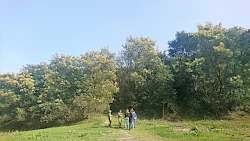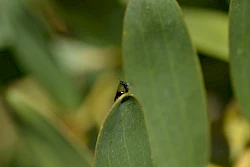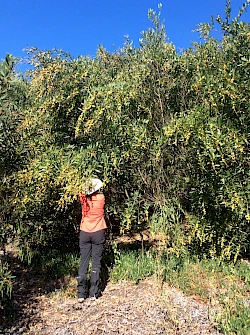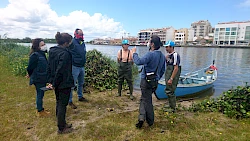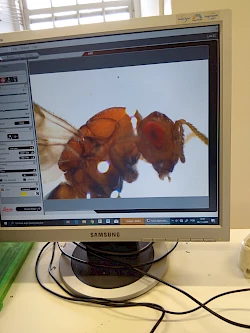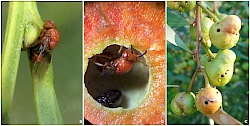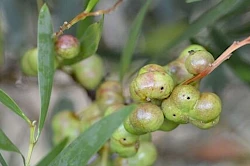 |
The INVASORAS.PT Lab aims to understand the processes of invasion and impacts of invasive alien plants across various biological levels, including interactions with biotic and abiotic factors. This research line has a strong applied component focused on the management and control of invasive alien plant, and a robust investment in public awareness and outreach, including citizen science. |
Other information
The INVASORAS.PT Lab is dedicated to comprehending the intricate processes underlying invasion and impacts of invasive alien plants across diverse biological levels, encompassing their interactions with both biotic and abiotic factors. This research line boasts a robust practical dimension centred on addressing the challenges posed by the invasion of alien plants into ecosystems, along with a substantial commitment to fostering public awareness and engagement, including citizen science.
The lab encompasses four primary focus areas: i) Ecology and Impacts of Invasive Plants, seeking to enhance our understanding of invasive plants, their ecological dynamics, and the impacts they promote; ii) Biological Control of Invasive Plants, delving into exploring the use of this nature-based solution to manage invasive plants; iii) Management of Invasive Plants, concentrating on devising effective strategies for managing invasive plants, encompassing prevention, early detection, and control measures; and iv) Public Outreach and Citizen Science, emphasizing engagement with the broader community through outreach initiatives and the active involvement of citizens and other stakeholders.
Collectively, these research lines are geared towards contributing to more effective global management of biological invasions by alien plants. Their scope extends from prevention to early detection, control, and mitigation, spanning both terrestrial and aquatic ecosystems.
Research areas
- Biological invasions
- Ecology and management of plant invasions
- Biological control
- Restoration
- Citizen Science
- Public outreach
Team
Recent publications
- Richardson, D.M., Le Roux, J.J., Marchante, E. (Eds.) 2023. Wattles – Australian Acacia species around the world. CABI. 560 pages. ISBN 978-1-80062-217-3. doi/book/10.1079/9781800622197.0000
- Almeida, M.R., Marchante, E., Marchante, H. 2023. Public perceptions about the invasive pampas grass, Cortaderia selloana: a case study of environmentally conscious citizens in Southern Europe. Biological invasions. 25: 2043–2056. doi.org/10.1007/s10530-023-03025-3
- Duarte, L.N., Marchante, E., Marchante, H. 2023. Managing an invasive tree in coastal dunes: the importance of follow-up treatments to improve the recovery of protected habitats. Frontiers in Environmental Science, 11:1113876. doi.org/10.3389/fenvs.2023.1113876
- Marchante, H., Marchante, E., Verbrugge, L., Lommen, S., Shaw, R. 2023. Knowledge and perceptions of invasive plant biocontrol in Europe versus the rest of the world. Journal of Environmental Management. 327: 116896. doi.org/10.1016/j.jenvman.2022.116896
- Price-Jones, V., Brown, P.M.J., Adriaens, T., Tricarico, E., Farrow, R.A., Cardoso, A.C., Gervasini, E., Groom, Q., Reyserhove, L., Schade, S., Tsinaraki, C., Marchante, E. 2022. Eyes on the aliens: citizen science contributes to research, policy and management of biological invasions in Europe. NeoBiota 78: 1-24. doi.org/10.3897/neobiota.78.81476
- Anđelković, A.A., Handley, L.L., Marchante, E., Adriaens, T., Brown, P.M.J., Tritarico, E., Verbrugge, L.N.H. 2022. A review of volunteers' motivations to monitor and control invasive alien species. NeoBiota 73: 153–175. doi:10.3897/neobiota.73.79636
Contacts
E-mail: emarchante@uc.pt
Website: https://invasoras.pt/


